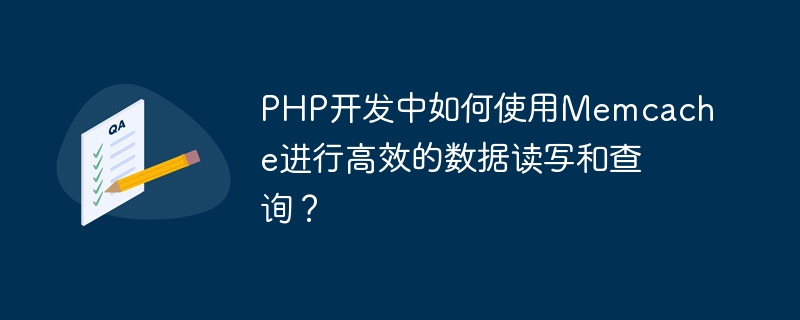

How to use Memcache for efficient data reading, writing and querying in PHP development?
Memcache is a high-performance distributed memory object cache system that can effectively handle data read, write and query operations, improving the performance and response speed of web applications. In PHP development, using Memcache can greatly improve data access efficiency. This article will introduce how to use Memcache for efficient data reading, writing and querying in PHP development, and provide specific code examples.
First, you need to use PHP's Memcache extension to connect and configure the Memcache server. You can connect through the following code:
$memcache = new Memcache();
$memcache->connect('localhost', 11211);In this example, we connect to the local Memcache server, using port 11211 by default. If the Memcache server is running on a different host or using a different port, the connection parameters need to be modified accordingly.
Next, you can use Memcache to store and read data. You can use the set() method to store data, and the get() method to read data. The sample code is as follows:
// 存储数据
$memcache->set('key', 'value', false, 3600); // 设置缓存有效期为1小时
// 读取数据
$value = $memcache->get('key');
if ($value !== false) {
echo $value;
} else {
// 从数据库或其他来源获取数据
// 并将数据存储到Memcache中,以便下次读取
$value = 'data from database';
$memcache->set('key', $value, false, 3600);
echo $value;
}In this example, we store the data in Memcache and set the cache validity period to 1 hour. When reading data, first try to obtain the data from Memcache. If the acquisition fails, obtain the data from the database or other sources, and store the data in Memcache for the next reading. This can effectively reduce the database load and increase the speed of data reading.
In addition to storing and reading data, Memcache can also be used to quickly query data. You can use the add() method to store the query results in Memcache, and the get() method to obtain the query results. The sample code is as follows:
// 查询数据
$result = $memcache->get('query_key');
if ($result !== false) {
echo 'Query result from cache';
} else {
// 从数据库或其他来源查询数据
$result = 'query result';
$memcache->add('query_key', $result, false, 60); // 设置查询结果的缓存有效期为1分钟
echo $result;
}In this example, we first try to obtain the query results from Memcache. If the acquisition fails, we query the data from the database or other sources and store the query results in Memcache. The next time you query the same data, you can get the results directly from Memcache to improve the query speed.
In summary, using Memcache for efficient data reading, writing and querying can significantly improve the performance and response speed of PHP applications. By connecting and configuring the Memcache server, storing and reading data, and querying data, the database load can be effectively reduced and the efficiency of data access can be improved. I hope the above content will help you use Memcache for data operations in PHP development.
The above is the detailed content of How to use Memcache for efficient data reading, writing and querying in PHP development?. For more information, please follow other related articles on the PHP Chinese website!




